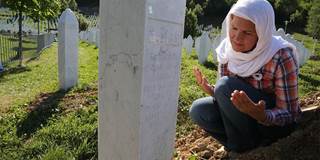The UN Security Council is considering a resolution that condemns denial of the genocide at Srebrenica, describing it as “hampering efforts at reconciliation in Bosnia and Herzegovina.” And indeed, victim groups cannot imagine reconciling with the Bosnian Serbs as long as they are trying to rewrite history.
CHICAGO – Driving into Srebrenica, where a brutal genocide was carried out 20 years ago, remains a surreal experience. It lies deep within the time-warped landscape of Republika Srpska, the economically depressed Serb sector of Bosnia and Herzegovina. Streets evoke a ghost town. The central square is barren, with none of the typical outdoor cafes teeming with locals and tourists common in other cities and towns in the more prosperous Federation, or non-Serb, region of the country.
Still standing on many of Srebrenica’s streets are the gutted homes of the Muslims who were routed out by Bosnian Serb forces led by General Ratko Mladić. A few miles north of town is the former United Nations peacekeeping base of Potočari, where now rest the fractured remains of most of the more than 8,000 mainly Muslim men and boys slaughtered over several days in July 1995. The cemetery is an impressive but haunting demonstration not only of the genocide itself; but also of the survivors’ determination that it be remembered.
The house that was used to rape Muslim women, while the men and boys were being led to their deaths, still stands next to the cemetery. It is occupied by Serbs. Every day, thousands of Bosnian Serbs living in the area walk or drive by the crumbling homes of the cleansed Muslims, the vast field of white Islamic grave stones, and the rape house, each one boldly reminding them of the undeniable.

CHICAGO – Driving into Srebrenica, where a brutal genocide was carried out 20 years ago, remains a surreal experience. It lies deep within the time-warped landscape of Republika Srpska, the economically depressed Serb sector of Bosnia and Herzegovina. Streets evoke a ghost town. The central square is barren, with none of the typical outdoor cafes teeming with locals and tourists common in other cities and towns in the more prosperous Federation, or non-Serb, region of the country.
Still standing on many of Srebrenica’s streets are the gutted homes of the Muslims who were routed out by Bosnian Serb forces led by General Ratko Mladić. A few miles north of town is the former United Nations peacekeeping base of Potočari, where now rest the fractured remains of most of the more than 8,000 mainly Muslim men and boys slaughtered over several days in July 1995. The cemetery is an impressive but haunting demonstration not only of the genocide itself; but also of the survivors’ determination that it be remembered.
The house that was used to rape Muslim women, while the men and boys were being led to their deaths, still stands next to the cemetery. It is occupied by Serbs. Every day, thousands of Bosnian Serbs living in the area walk or drive by the crumbling homes of the cleansed Muslims, the vast field of white Islamic grave stones, and the rape house, each one boldly reminding them of the undeniable.